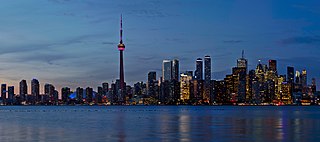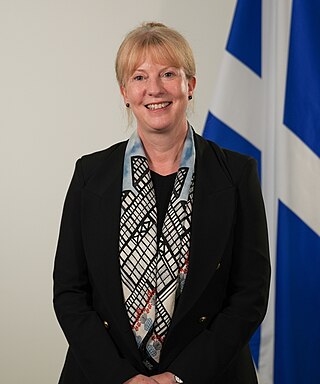
The economy of Canada is a highly developed mixed economy, with the world's tenth-largest economy as of 2023, and a nominal GDP of approximately US$2.117 trillion. Canada is one of the world's largest trading nations, with a highly globalized economy. In 2021, Canadian trade in goods and services reached $2.016 trillion. Canada's exports totalled over $637 billion, while its imported goods were worth over $631 billion, of which approximately $391 billion originated from the United States. In 2018, Canada had a trade deficit in goods of $22 billion and a trade deficit in services of $25 billion. The Toronto Stock Exchange is the tenth-largest stock exchange in the world by market capitalization, listing over 1,500 companies with a combined market capitalization of over US$3 trillion.

The economy of Indonesia is a mixed economy with dirigiste characteristics, and it is one of the emerging market economies in the world and the largest in Southeast Asia. As an upper-middle income country and member of the G20, Indonesia is classified as a newly industrialized country. Indonesia nominal GDP reached 20.892 quadrillion rupiah in 2023, it is the 16th largest economy in the world by nominal GDP and the 7th largest in terms of GDP (PPP). Indonesia's internet economy reached US$77 billion in 2022, and is expected to cross the US$130 billion mark by 2025. Indonesia depends on the domestic market and government budget spending and its ownership of state-owned enterprises. The administration of prices of a range of basic goods also plays a significant role in Indonesia's market economy. However, micro, medium and small companies contribute around 61.7% of the economy and significant major private owned companies and foreign companies are also present

The economy of North Macedonia has become more liberalized, with an improved business environment, since its independence from Yugoslavia in 1991, which deprived the country of its key protected markets and the large transfer payments from Belgrade. Prior to independence, North Macedonia was Yugoslavia's poorest republic. An absence of infrastructure, United Nations sanctions on its largest market, and a Greek economic embargo hindered economic growth until 1996.

The economy of Morocco is considered a relatively liberal economy, governed by the law of supply and demand. Since 1993, in line with many Western world changes, Morocco has followed a policy of privatisation. Morocco has become a major player in African economic affairs, and is the 6th largest African economy by GDP (PPP). The World Economic Forum placed Morocco as the most competitive economy in North Africa, in its African Competitiveness Report 2014–2015.

The economy of Rwanda has undergone rapid industrialisation due to a successful governmental policy. It has a mixed economy. Since the early-2000s, Rwanda has witnessed an economic boom, which improved the living standards of many Rwandans. The President of Rwanda, Paul Kagame, has noted his ambition to make Rwanda the "Singapore of Africa". The industrial sector is growing, contributing 16% of GDP in 2012.

The economy of Singapore is a highly developed mixed market economy with dirigiste characteristics. Singapore's economy has been consistently ranked as the most open in the world, the joint 4th-least corrupt, and the most pro-business. Singapore has low tax-rates and the third highest per-capita GDP in the world in terms of purchasing power parity (PPP). The Asia-Pacific Economic Cooperation (APEC) is headquartered in Singapore.

The economy of Mozambique is $14.396 billion by gross domestic product as of 2018, and has developed since the end of the Mozambican Civil War (1977–1992). In 1987, the government embarked on a series of macroeconomic reforms, which were designed to stabilize the economy. These steps, combined with donor assistance and with political stability since the multi-party elections in 1994, have led to dramatic improvements in the country's growth rate. Inflation was brought to single digits during the late 1990s, although it returned to double digits in 2000–02. Fiscal reforms, including the introduction of a value-added tax and reform of the customs service, have improved the government's revenue collection abilities.

The Government of Jersey is the executive body of the States of Jersey and is the central government of the Bailiwick of Jersey. The government is led by the Chief Minister, who nominates all the remaining ministers, all elected by the States Assembly.

The economy of England is the largest economy of the four countries of the United Kingdom. England's economy is one of the largest and most dynamic in the world, with an average GDP per capita of £37,852 in 2022.

The economy of Scotland is an open mixed economy, mainly services based, which is the second largest economy amongst the countries of the United Kingdom. It had an estimated nominal gross domestic product (GDP) of £218.0 billion in 2023, including oil and gas extraction in the country's continental shelf region. Since the Acts of Union 1707, Scotland's economy has been closely aligned with the economy of the rest of the United Kingdom (UK), and England has historically been its main trading partner. Scotland conducts the majority of its trade within the UK: in 2017, Scotland's exports totalled £81.4 billion, of which £48.9 billion (60%) was within the UK, £14.9 billion with the European Union (EU), and £17.6 billion with other parts of the world. Scotland's imports meanwhile totalled £94.4 billion including intra-UK trade leaving Scotland with a trade deficit of £10.4 billion in 2017.
The economic history of the Republic of Turkey had four eras or periods. The first era had the development policy emphasizing private accumulation between 1923 and 1929. The second era had the development policy emphasized state accumulation in a period of global crises between 1929 and 1945. The third era was state-guided industrialization based on import-substituting protectionism between 1950 and 1980. The final, era was the opening of the economy to liberal trade in goods, services and financial market transactions since 1981.

The economy of Montenegro is currently in a process of transition, as it navigates the impacts of the Yugoslav Wars, the decline of industry following the dissolution of the Yugoslavia, and economic sanctions imposed by the United Nations. Montenegro joined the World Trade Organization on 29 April 2012. Montenegro joined the North Atlantic Treaty Organization on 5 June 2017.

The Cabinet Secretary for Finance and Local Government, commonly referred to as the Finance Secretary, is a member of the Cabinet in the Scottish Government. The Cabinet Secretary has Ministerial responsibility for the Scottish Government's Finance Directorates.

The work of the Scottish Government is carried out by Directorates, each headed by a Director. The Directorates are grouped into a number of Directorates-General families, each headed by a Director-General. However, the individual Directorates are the building blocks of the system. The Directorates are further broken down into 'Divisions' and then by Units and finally by Teams. Divisions usually consist of 25-50 people. There is no direct correspondence between the political responsibilities of the Ministers in the Scottish Government and the Directorates, although in some cases there is considerable overlap. The Directorates are also responsible for a number of government agencies and non-departmental public bodies. Some government work is also carried out by Executive Agencies such as Transport Scotland, who sit outside the Directorates structure, but are also staffed by civil servants.
The economic liberalisation in India refers to the series of policy changes aimed at opening up the country's economy to the world, with the objective of making it more market-oriented and consumption-driven. The goal was to expand the role of private and foreign investment, which was seen as a means of achieving economic growth and development. Although some attempts at liberalisation were made in 1966 and the early 1980s, a more thorough liberalisation was initiated in 1991.

The Ministry of Economy, Trade and Business (MINECO) is the department of the Government of Spain responsible for proposing and carrying out the government policy on economic affairs, through reforms to improve competitiveness and trade, focused on business support and the potential growth of the economy. At the same time, it directs the commercial policy of internationalization of companies, as well as the supervision of investments and foreign transactions.

The Ministry of Economic Affairs is the Netherlands' ministry responsible for international trade, commercial, industrial, investment, technology, space policy, as well as tourism.

The Ministry of Agriculture of Azerbaijan is an Azerbaijani governmental agency within the Cabinet of Azerbaijan in charge of regulation of the economic activity in the agricultural sector of the country with a purpose of increasing the sector's production capacity. Agriculture is Azerbaijan's second most important natural resource playing a significant role in the country's economy. The ministry is headed by Inam Karimov.

The Scottish Government Economy Directorates are a group of Directorates of the Scottish Government. They were rebranded as the Economy Directorates in July 2016, having previously been reorganised in December 2010 and then in June 2014. In July 2021, a further re-organisation led to the creation of the Net Zero Directorates, with Agriculture & Rural Economy, Marine Scotland, Energy & Climate Change, Environment & Forestry, Transport Scotland, Forestry and Land Scotland and Scottish Forestry moving to the new Directorate General.

The Ministry of National Development Planning/National Development Planning Agency is a ministry of the Republic of Indonesia that has the task to oversee government affairs in the field of national development planning to assist the President in organizing state government. The minister is responsible to the President. The Ministry of National Development Planning uses organizational units and resources within the National Development Planning Agency.

















